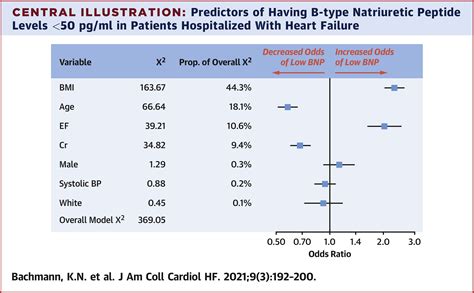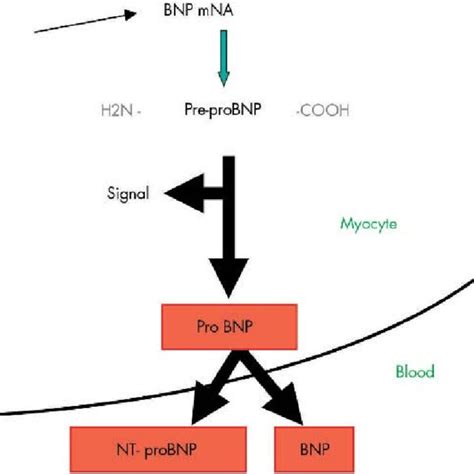Intro
Discover the significance of BNP peptide levels, a crucial biomarker for heart failure diagnosis, and learn how B-type natriuretic peptide tests help assess cardiac function, guiding treatment for cardiovascular conditions like atrial fibrillation and congestive heart failure.
The importance of understanding BNP peptide levels cannot be overstated, particularly in the context of heart health. B-type natriuretic peptide, or BNP, is a hormone produced by the heart, and its levels in the blood can serve as a critical indicator of how well the heart is functioning. Elevated BNP levels are often associated with heart failure, a condition where the heart is unable to pump enough blood to meet the body's needs. This condition can lead to a range of symptoms, including shortness of breath, fatigue, and swelling in the legs and feet. By understanding BNP peptide levels, healthcare providers can diagnose heart failure more accurately and monitor the effectiveness of treatments.
BNP peptide levels are measured through a blood test, which is a relatively simple and non-invasive procedure. The results of this test can provide valuable insights into the heart's condition, helping healthcare providers to determine the best course of action for patients. For instance, if BNP levels are found to be elevated, it may indicate that the heart is under strain, and further testing or treatment may be necessary. On the other hand, if BNP levels are within the normal range, it can provide reassurance that the heart is functioning properly. The significance of BNP peptide levels extends beyond diagnosis, as they can also be used to monitor the progression of heart failure and the effectiveness of treatments over time.
The role of BNP peptide levels in heart health is multifaceted, and understanding their significance can empower individuals to take a more active role in managing their cardiovascular well-being. By recognizing the importance of BNP peptide levels, individuals can work closely with their healthcare providers to monitor their heart health and make informed decisions about their care. This collaborative approach can lead to better health outcomes, improved quality of life, and a reduced risk of complications associated with heart failure. As research continues to uncover the complexities of BNP peptide levels, it is essential for individuals to stay informed and engaged in their heart health, fostering a deeper understanding of this critical aspect of cardiovascular wellness.
Introduction to BNP Peptide Levels

How BNP Peptide Levels Are Measured
The measurement of BNP peptide levels is typically performed through a blood test. This test involves drawing a sample of blood from a vein, usually in the arm, and sending it to a laboratory for analysis. The results of the test are usually available within a few hours, although this can vary depending on the laboratory and the specific testing procedures used. The measurement of BNP peptide levels is a relatively simple and non-invasive procedure, making it a useful tool for diagnosing and monitoring heart failure.The Role of BNP Peptide Levels in Heart Failure

Interpreting BNP Peptide Levels
Interpreting BNP peptide levels requires careful consideration of various factors, including the individual's medical history, symptoms, and other test results. In general, BNP levels are considered to be elevated if they exceed 100 pg/mL, although this can vary depending on the specific testing procedures used and the individual's age and medical condition. Elevated BNP levels can indicate heart failure, although they can also be elevated in other conditions, such as pulmonary embolism or acute coronary syndrome. By interpreting BNP peptide levels in the context of other diagnostic information, healthcare providers can make more accurate diagnoses and develop effective treatment plans.Factors That Influence BNP Peptide Levels

BNP Peptide Levels and Kidney Function
Kidney function can significantly influence BNP peptide levels, as impaired kidney function can lead to elevated BNP levels. This is because the kidneys play a critical role in filtering waste and excess fluids from the blood, and impaired kidney function can lead to a buildup of toxins and excess fluids in the body. Elevated BNP levels in individuals with impaired kidney function can indicate that the heart is under strain, which can be a sign of heart failure. By considering kidney function when interpreting BNP peptide levels, healthcare providers can develop more effective treatment plans and improve health outcomes.Using BNP Peptide Levels to Monitor Heart Failure

BNP Peptide Levels and Treatment Outcomes
The relationship between BNP peptide levels and treatment outcomes is complex, and several factors can influence the effectiveness of treatments. For instance, individuals with elevated BNP levels may require more aggressive treatment, including medications such as beta blockers and ACE inhibitors. Additionally, individuals with impaired kidney function may require adjustments to their treatment plan to minimize the risk of adverse events. By considering BNP peptide levels and other factors, healthcare providers can develop effective treatment plans that improve health outcomes and reduce the risk of complications.BNP Peptide Levels and Cardiovascular Risk

BNP Peptide Levels and Mortality Risk
The relationship between BNP peptide levels and mortality risk is complex, and several factors can influence the risk of adverse events. For instance, individuals with elevated BNP levels may be at increased risk of mortality due to cardiovascular events such as heart attacks and strokes. Additionally, individuals with impaired kidney function may be at increased risk of mortality due to the effects of kidney disease on the heart. By considering BNP peptide levels and other factors, healthcare providers can assess mortality risk and develop effective strategies to reduce this risk.Future Directions for BNP Peptide Levels

BNP Peptide Levels and Personalized Medicine
The concept of personalized medicine holds much promise, as it involves tailoring treatment plans to the individual's unique needs and characteristics. BNP peptide levels can play a critical role in personalized medicine, as they can provide valuable insights into the individual's heart health and guide treatment decisions. By considering BNP peptide levels and other factors, healthcare providers can develop effective treatment plans that improve health outcomes and reduce the risk of complications. This can include lifestyle modifications, medications, and other interventions that are tailored to the individual's unique needs and characteristics.What are BNP peptide levels, and why are they important?
+BNP peptide levels refer to the concentration of B-type natriuretic peptide in the blood. This hormone is produced by the heart in response to strain or stretching, and elevated levels can indicate heart failure. BNP peptide levels are important because they can provide valuable insights into heart health and guide treatment decisions.
How are BNP peptide levels measured, and what do the results mean?
+BNP peptide levels are measured through a blood test, and the results can provide insights into heart health. Elevated levels can indicate heart failure, while normal levels can provide reassurance that the heart is functioning properly. The results of the test should be interpreted in the context of other diagnostic information, including medical history, symptoms, and other test results.
What factors can influence BNP peptide levels, and how do they impact interpretation?
+Several factors can influence BNP peptide levels, including age, sex, and body mass index (BMI). Additionally, kidney function can impact BNP peptide levels, as impaired kidney function can lead to elevated levels. By considering these factors, healthcare providers can interpret BNP peptide levels more accurately and develop effective treatment plans.
In conclusion, BNP peptide levels play a critical role in heart health, and understanding their significance can empower individuals to take a more active role in managing their cardiovascular well-being. By recognizing the importance of BNP peptide levels, individuals can work closely with their healthcare providers to monitor their heart health and make informed decisions about their care. As research continues to uncover the complexities of BNP peptide levels, it is essential for individuals to stay informed and engaged in their heart health, fostering a deeper understanding of this critical aspect of cardiovascular wellness. We invite you to share your thoughts and questions about BNP peptide levels in the comments section below, and to share this article with others who may benefit from this valuable information.
